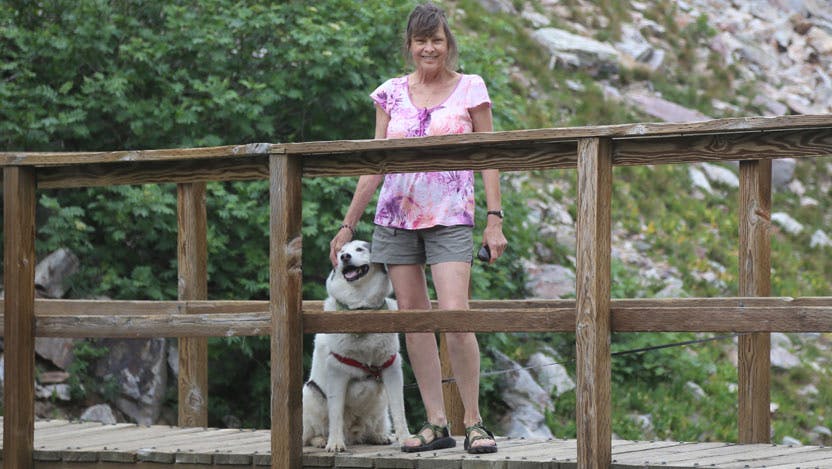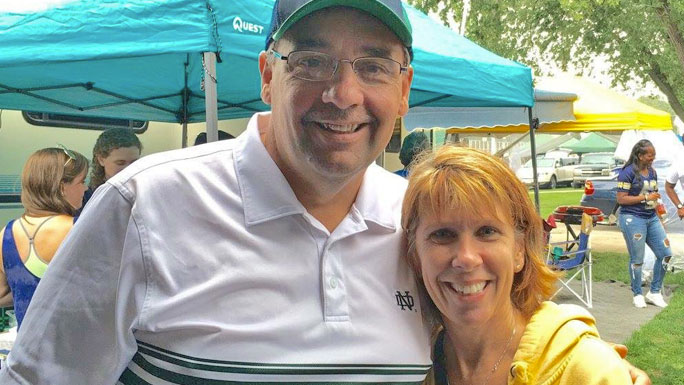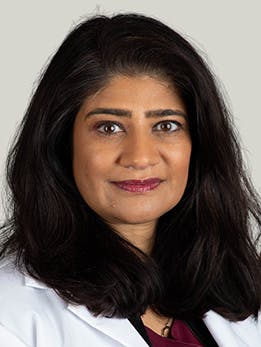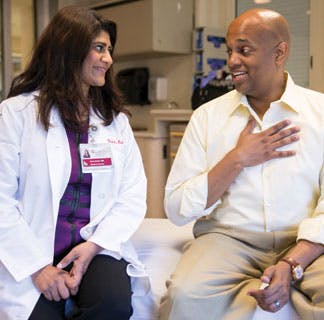Two lymphoma patients, two trailblazing treatments

Relapsed non-Hodgkin lymphoma was once a fatal disease. But now, new immunotherapies are changing the path for patients if the cancer comes back after standard treatments.
“It’s a pretty amazing time for lymphoma treatment,” said oncologist Sonali Smith, MD, director of the adult lymphoma program at the University of Chicago Medicine and an internationally recognized expert on therapies for the blood cancer. “These immunotherapies are improving the cure rate for non-Hodgkin lymphoma and helping patients live better and longer.”
The most common type of non-Hodgkin lymphoma is called diffuse large B-cell lymphoma (DLBCL). Standard treatment for DLBCL begins with a combination of five chemotherapy medications.
“Our goal is to achieve cure the first time around,” Smith said. “But if the cancer recurs, we have several other treatments — including more chemotherapy followed by stem cell transplant — to offer to our patients.”
Immunotherapy has been a game-changer for lymphoma patients. I believe it will break us through to the next layer of defeating cancer.
But for patients Linda Winkler and Scott McIntyre, the lymphoma was particularly aggressive and returned after multiple therapies, including an autologous (using the patient’s own cells) stem cell transplant. Smith offered them the opportunity to participate in clinical trials testing new immunotherapies for DLBCL.
Considered revolutionary in the treatment of blood cancers, immunotherapy harnesses the power of the immune system to fight cancer. “There are several types of immunotherapy, which work in different ways,” Smith said. “Our team works with each patient to offer the most appropriate therapy for their disease.”
From a wheelchair to a hiking trail
Linda Winkler was first diagnosed with a slow-growing lymphoma in 2005. She underwent several rounds of chemotherapy over the next decade. But in the fall of 2016, the disabled dietitian and Colorado resident learned the cancer had come back, and had transformed into DLBCL. When a stem cell transplant failed to bring the cancer into remission, her doctors gave her just a few months to live. The only hope would be to participate in a clinical trial of a new treatment.
“My sister, who lives in Illinois, found Dr. Smith and a trial testing immunotherapy for DLBCL,” Winkler said. With the help of her family, she arrived at UChicago Medicine a week later.
“Linda was so weak from her illness that she had to be brought to our clinic in a wheelchair,” Smith said. “We began treatment on the trial immediately.”
The multi-center phase 1 trial, which was led by Smith, tested the combination of the established drug rituximab with an immune checkpoint inhibitor now called magrolimab. Together, the two anti-cancer medications block a “don’t eat me” signal that collectively protect cancer cells and activate an “eat me” signal, allowing disease-fighting immune cells (called macrophages) to engulf and kill them.
“We were able to manipulate the immune system of patients with non-Hodgkin lymphoma that had relapsed and progressed after various prior therapies,” Smith said. “And we could do it with limited side effects.”
Within a week of starting therapy, Winkler was feeling better. A month later, the cancer was in complete remission. By the end of the treatment, she was well enough to undergo a second stem cell transplant, this time with cells donated by a family member. At the time, patients whose cancer went into remission were referred for an allogeneic (using donor cells) stem cell transplant. This was considered to be the most aggressive and best treatment despite significant short- and long-term toxicity.
Winkler returned to her home in Colorado. She continues to receive treatment for graft versus host disease, a common side effect when a patient receives stem cells from a donor. But today, Winkler, a lover of the wilderness, spends as much time as possible in the mountains with friends and her dog Willow, a Siberian Husky/Akita mix.

“My treatments can get in the way of my hiking and camping,” she said. “But surviving lymphoma is wonderful. It feels like a miracle.”
‘The doctors didn’t give up’
In 2015, Scott McIntyre, a truck dealer in South Bend, Indiana, was losing his battle with DLBCL. Chemotherapy, a stem cell transplant and targeted therapy each brought only temporary remissions.
Just when he thought he had run out of options, Smith called him about a new trial for a promising immunotherapy called CAR T-cell being offered at UChicago Medicine and a few other select centers around the country.
CAR T-cell therapy involves extracting a cancer patient’s white blood cells and reprogramming the T cells — the roving warriors of the immune system — with an antibody-like protein called Chimeric Antigen Receptor, or CAR. The modified cells are returned to the patient’s body, a process that takes less than 10 minutes. These re-engineered T cells bypass healthy cells and latch on to and kill the diseased cells — enabling a patient’s own immune system to fight cancer.
Soon after having the procedure, McIntyre’s health improved. A few weeks later, Smith called him at home with the results of a new bone marrow biopsy. There was no cancer.

That was four years ago and the cancer has not come back. “CAR T was our ‘hail Mary pass,’” said McIntyre, a diehard Notre Dame fan. “We threw the ball up in the air and it ended up being a touchdown. The doctors didn’t give up.”
Having patients like McIntyre and Winkler return to a life “where they can cheer at a football game or hike in the mountains is the whole reason we are in this field,” Smith said.

Sonali M. Smith, MD
Sonali M. Smith, MD, is an expert in lymphoma care and research and is the Chief of the Section of Hematology/Oncology. Dr. Smith is actively researching new treatments for lymphoma, such as immunotherapies that harness the body's immune system to fight cancer.
Learn more about Dr. Smith
Lymphoma care
Tremendous strides have been made in the treatment of lymphoma — a group of blood cancers that begins in the white blood cells that fight infection in the body. UChicago Medicine lymphoma experts are among the first in the nation to offer innovative treatment options, including CAR T-cell therapy.
Learn more about our lymphoma services